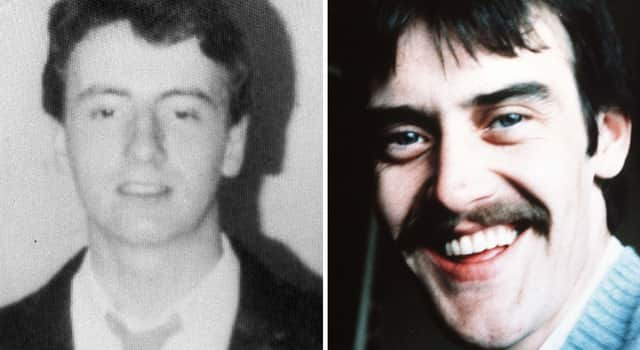Inquest into 1984 Derry killings hears from operations officer


The witness described as Soldier I was giving evidence to the resumed inquest into the deaths of William Fleming (19) from the Waterside and Daniel Doherty (23) from Creggan.
Mr Fleming and Mr Doherty were shot dead in the grounds of Gransha Hospital in Derry’s Waterside on December 6, 1984 by the SAS.
Advertisement
Hide AdAdvertisement
Hide AdThe former soldier giving evidence on Friday had served for around 14 years in the North, mainly in the Special Military Unit.
The soldier said that they had been briefed that an off duty member of the security forces was travelling to work in Gransha on the bus.
He said they were told that the IRA intended to use a motorbike to shoot this individual but he said they did not know where the bus was going to stop.
Soldier I said he was not told who the target was or what sort of bus he was travelling on.
Advertisement
Hide AdAdvertisement
Hide AdThe inquest heard that the SMU's job was to covertly observe incidents to try and stop IRA operations and arrest those involved.
The former soldier said that all operations had to be approved by RUC Special Branch and the DMSU would have to be on hand.
This witness said he was in the operation room in RUC Strand Road during this operation on December 6, 1984.
The inquest head that the motorbike in question was sighted near the grounds of Gransha Hospital but then it was lost to sight.
Advertisement
Hide AdAdvertisement
Hide AdHe said at that stage the British Army were unsure if those on the bike were armed.
The witness said that the bus was actually in the grounds of the hospital before the motorbike was located and then he said he received a communication from Soldier A that there had been contact.
He then said he was told 'two terrorists shot, weapons recovered, all okay'.
The former soldier said that the guiding principles for the use of force was the Yellow Card, which authorised the use of force if life was in danger.
Advertisement
Hide AdAdvertisement
Hide AdHe said after the shooting there would have been a short debriefing of those involved.
The witness was asked about other soldiers who said that they had been involved in a similar operation for two weeks prior to December 6, and he said he had no memory of that.
Three options for the actual operation were put to the witness, which included flooding the area with police, trying to drive the suspects into an RUC checkpoint or catch the suspects just before the act.
The former soldier said the first option just delayed the attack, the second option could have led to the suspects being arrested and then released so the best option was the third one.
He agreed that there were risks with this option but repeated that the aim was to call in the DMSU and arrest any suspects.
The hearing continues.